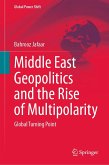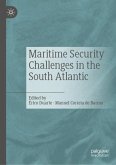The Palgrave Handbook on Geopolitics of Brazil and the South Atlantic
Herausgegeben:Leandro, Francisco José B. S.; Frogeri, Rodrigo Franklin; Li, Yichao; Garcia, Francisco Proença; Silva, Antonio Ruy de Almeida
The Palgrave Handbook on Geopolitics of Brazil and the South Atlantic
Herausgegeben:Leandro, Francisco José B. S.; Frogeri, Rodrigo Franklin; Li, Yichao; Garcia, Francisco Proença; Silva, Antonio Ruy de Almeida
- Gebundenes Buch
- Merkliste
- Auf die Merkliste
- Bewerten Bewerten
- Teilen
- Produkt teilen
- Produkterinnerung
- Produkterinnerung
Positioned at the intersection of regional leadership and global influence, this reference work offers a rigorous and timely analysis of Brazil s evolving geopolitical role as the world s fifth largest nation, South America s leading power, a strategic South Atlantic actor, and a pivotal member of the expanding BRICS+ coalition. Structured into four insightful parts (1) The Making of Brazil as an International Actor, (2) Geo-Economics and Technology, (3) Classic Perspectives on Geopolitics, and (4) Contemporary Debates: Critical and Meta Geopolitics - this book brings together a rich array of…mehr
Andere Kunden interessierten sich auch für
![Middle East Geopolitics and the Rise of Multipolarity Middle East Geopolitics and the Rise of Multipolarity]() Bahrooz JafaarMiddle East Geopolitics and the Rise of Multipolarity98,99 €
Bahrooz JafaarMiddle East Geopolitics and the Rise of Multipolarity98,99 €![Maritime Security Challenges in the South Atlantic Maritime Security Challenges in the South Atlantic]() Maritime Security Challenges in the South Atlantic53,99 €
Maritime Security Challenges in the South Atlantic53,99 €![The Palgrave Handbook of Disability and Citizenship in the Global South The Palgrave Handbook of Disability and Citizenship in the Global South]() The Palgrave Handbook of Disability and Citizenship in the Global South211,99 €
The Palgrave Handbook of Disability and Citizenship in the Global South211,99 €![The Palgrave Handbook of Intersectionality in Public Policy The Palgrave Handbook of Intersectionality in Public Policy]() The Palgrave Handbook of Intersectionality in Public Policy250,99 €
The Palgrave Handbook of Intersectionality in Public Policy250,99 €![The Palgrave Handbook of National Security The Palgrave Handbook of National Security]() The Palgrave Handbook of National Security189,99 €
The Palgrave Handbook of National Security189,99 €![Risk and the Security-Development Nexus Risk and the Security-Development Nexus]() Eamonn McConnonRisk and the Security-Development Nexus53,99 €
Eamonn McConnonRisk and the Security-Development Nexus53,99 €![The Palgrave Handbook of National Security The Palgrave Handbook of National Security]() The Palgrave Handbook of National Security189,99 €
The Palgrave Handbook of National Security189,99 €-
-
-
Positioned at the intersection of regional leadership and global influence, this reference work offers a rigorous and timely analysis of Brazil s evolving geopolitical role as the world s fifth largest nation, South America s leading power, a strategic South Atlantic actor, and a pivotal member of the expanding BRICS+ coalition. Structured into four insightful parts (1) The Making of Brazil as an International Actor, (2) Geo-Economics and Technology, (3) Classic Perspectives on Geopolitics, and (4) Contemporary Debates: Critical and Meta Geopolitics - this book brings together a rich array of topics that reflect Brazil s multifaceted global engagement. Beyond traditional themes like Brazilian politics, economy, and foreign policy, this volume delves into pressing contemporary issues: energy geopolitics, defence, regional engagement, Amazon geopolitics, polar and outer space affairs, nuclear autonomy, marine spatial planning, naval projects, food security, lithium, Artificial Intelligence, and submarine cables. The book also explores Brazil s strategic relationships with China, the United States, and the European Union, while offering fresh perspectives on its ties with African nations (e.g., Angola, Mozambique, Cabo Verde, Nigeria, South Africa), Russia, and India. Broader global themes such as ZOPACAS, CPLP, BRICS+ cooperation, and UN Security Council reform are also critically assessed.
Produktdetails
- Produktdetails
- Handbooks in Politics and International Relations
- Verlag: Palgrave Macmillan / Springer Nature Singapore / Springer, Berlin
- Artikelnr. des Verlages: 89503131, 978-981-95-1168-6
- Seitenzahl: 1000
- Erscheinungstermin: 13. Januar 2026
- Englisch
- Abmessung: 235mm x 155mm
- ISBN-13: 9789819511686
- ISBN-10: 9819511682
- Artikelnr.: 74873993
- Herstellerkennzeichnung
- Springer-Verlag GmbH
- Tiergartenstr. 17
- 69121 Heidelberg
- ProductSafety@springernature.com
- Handbooks in Politics and International Relations
- Verlag: Palgrave Macmillan / Springer Nature Singapore / Springer, Berlin
- Artikelnr. des Verlages: 89503131, 978-981-95-1168-6
- Seitenzahl: 1000
- Erscheinungstermin: 13. Januar 2026
- Englisch
- Abmessung: 235mm x 155mm
- ISBN-13: 9789819511686
- ISBN-10: 9819511682
- Artikelnr.: 74873993
- Herstellerkennzeichnung
- Springer-Verlag GmbH
- Tiergartenstr. 17
- 69121 Heidelberg
- ProductSafety@springernature.com
Francisco José B. S. Leandro earned his doctorate in Political Science and International Relations from the Catholic University of Portugal in 2010. He currently serves as Associate Professor with Habilitation in International Relations at the Faculty of Social Sciences, University of Macau, and holds the position of Deputy Director at the Institute for Global and Public Affairs. He is affiliated with CEI-ISCTE-IUL and OBSERVARE—an academic centre for the study of International Relations founded in 1996 at the Autonomous University of Lisbon, Portugal—where he contributes to research on foreign relations and global governance. Rodrigo Franklin Frogeri holds a doctorate in Information Systems and Knowledge Management, a master’s degree in Administration, and a bachelor’s degree in Computer Science. He is currently a tenured Professor in the Graduate Program in Management and Regional Development at the University Center of Southern Minas (UNIS-MG, Varginha, Brazil), and also serves as a faculty member in the Master’s in Data Science programme at Universidad Científica del Sur (Lima, Peru). Since early 2024, he has held the position of Editor-in-Chief of Mythos (ISSN: 1984-0098), a peer reviewed academic journal dedicated to interdisciplinary research. Yichao Li earned her Ph.D. from the Institute for Research on Portuguese-speaking Countries at the City University of Macau (China) in 2021, following a master’s degree in Comparative Civil Law (Chinese) from the University of Macau in 2018. From 2021 to 2022, she was a postdoctoral researcher at the Centre for International Studies, ISCTE-IUL, in Lisbon, Portugal. Since 2023, she has served as an Assistant Research Fellow at the Institute of African Studies, Zhejiang Normal University, China. She is also a member of OBSERVARE, a research centre on International Relations at the Autonomous University of Lisbon, established in 1996. Francisco Proença Garcia is Full Professor and Associate Dean at the Institute for Political Studies, Portuguese Catholic University. His distinguished career includes serving as Portugal’s national representative to NATO’s Science and Technology Organization (2014–2016), Head of Postgraduate Studies at the Military Academy (2014), and Advisor to the Chief of the Army Staff (2011–2014). He was also Military Advisor to the Portuguese Delegation to NATO and the European Defence Agency (2008–2011), and President of the Scientific Council at the Higher Institute of Business Communication (2013). He is an Academic of the International Academy of Portuguese Culture, International Correspondent of the Institute of Geography and Military History of Brazil, and Director of the Lisbon Geographical Society. Antonio Ruy de Almeida Silva is a Retired Admiral of the Brazilian Navy and holds a Ph.D. in International Relations from the Pontifical Catholic University of Rio de Janeiro. He currently serves as a Senior Researcher at the Centre for Advanced Strategic Studies at Fluminense Federal University (NEA/UFF), and as a Professor in the Postgraduate Program in International Security and Defense at the Brazilian War College. Additionally, he acts as an Advisor at the Centre for Political-Strategic Studies of the Brazilian Navy. He is a former Director of the Brazilian Navy War College and has published extensively on international security, defence diplomacy, and South Atlantic affairs.
Acknowledgments (Editors-TBC) .- Foreword (TBC).- Introduction (Editors).- List of Contributors.- Part 1 The Making of Brazil as an International Actor.- Chapter 1-An Early Geopolitical Project for Building Up a Great Nation in South America: The Organic Memorial of Historian Francisco Varnhagen in Middle 19th Century Brazil.- Chapter 2-Political history of Brazil: From the Military Dictatorship (1964-1985) to BRICS Membership.- Chapter 4-International Relations in Latin America: The State of the Art.- Chapter 5-Brazil's Regional Disengagement: South America in Recent Brazilian Foreign Policy (2011-2023).- Chapter 6-Brazilian Naval Projects, South Atlantic, and the World: The Shift to the Blue Waters beyond the Strategic Environment.- Chapter 7-Stagnation of an Emerging Power: One Decade of Brazilian Foreign Policy (2013-2023).- Chapter 8-Good Governance in Brazilian Public Administration: Level of Adherence of Brazilian Public Sector to Western Liberal Democratic Good Governance Principles.- Chapter 9-Energy Geopolitics in Brazil after January 2023: Challenges and Opportunities.- Chapter 10-Geopolitics and Marine Spatial Planning in Brazil.- Part 2 Geo-Economics and Technology.- Chapter 11-Navigating Uncharted Waters: Brazil's Strategic Responses to Environmental, Economic and Geopolitical Shifts in the South Atlantic.- Chapter 12-Brazil at the Crossroads of the International Monetary and Financial System: An Analysis of the Response to the Renminbi Internationalization Process.- Chapter 13-Economic Development in Latin American Countries: An Analysis Based on Investment, Complexity, and Exports.- Chapter 14-A Tripod Approach to Assess the Viability of Espadarte Harbor: Ability of Brazilian Businesses, Brazilian Market Share in the Global Market, and Brazilian Geoeconomic Power.- Chapter 15-Brazil-China Strategic Partnership and the Belt and Road Initiative.- Chapter 16-US-China Competition on the South Atlantic and Implications for Brazil.- Chapter 17-The South Atlantic in China s 21st Century Maritime Silk Road: Geopolitical and Technological Implications for Brazil.- Chapter 18-The Angola-Mozambique Corridor in the Oceanpolitic of the Global South.- Chapter 19-Seeking a Place in the South Atlantic: An Analysis of Brazilian and Chinese Capabilities and Intentions in the Region in the XXIst Century.- Chapter 20-Blue Economy & Maritime Security in the South Atlantic: Brazil s Geopolitics and Strategic Positioning in Times of Power Rebalancing.- Chapter 21-Escaping the Commodity Export Trap: Brazil´s Search for a New Industrialization.- Chapter 22-The Geo-economy of the Lithium Triangle: Chile, Bolivia and Argentina.- Chapter 23-Will Brazil be Able to Help Modernizing Some African Countries?.- Part 3 Classic Perspectives on Geopolitics.- Chapter 24-The Geopolitics of the Strategic Brazilian Surrounds: Land and Maritime Spatial Continuities.- Chapter 25-UNSC Reform and Brazil's Foreign Policy.- Chapter 26-Between a Zone of Peace and Emerging Risks: Argentina s Perspective on the South Atlantic.- Chapter 27-The Brazilian Way of Defense: The Role of the Armed Forces in a Country that does not Perceive Clear Foreign Threats.- Chapter 28-Brazil's External Policy towards the Middle East and North Africa (MENA) under President Lula (2003-2010): A New Important Player in the MENA Region.- Chapter 29-Cabo Verde and Maritime Security in the South Atlantic.- Chapter 30-The Challenges in Africa's Maritime Domain: Brazil's strategy for the Gulf of Guinea.- Chapter 31-Brazil: A Regional Provider of Stability and Security.- Chapter 32-Geostrategic Potential of the Brazil-Angola Axis in the Security of the South Atlantic.- Chapter 33-The Geopolitical Positioning of Angola in the South-Atlantic Ocean Corridor: Observance of International Maritime Law as a Guarantee of Border Security.- Chapter 34-Proximity and Distance: Fluctuations in Bilateral Relations between Brazil and Nigeria in the 21st century.- Chapter 35-Protecting South America's Waters: A Closer Look at Maritime Security and CAMAS.- Chapter 36-Big Brother is watching you: Assessing Brazil s contribution to the Democratic Stability in South America.- Chapter 37-Brazil and South Africa in International Affairs: Foreign Policy Synergies in Advancing the South Atlantic and Global South s Economic Development and Security?.- Chapter 38-Brazil, South Africa, and the Strategic Partnership Expressed in the Similarities of Agendas and Themes in Foreign Policy.- Chapter 39-Political Traits of Brazil-Russia Relations: Similarity in Goals and Differences in Perspectives.- Chapter 40-Brazil-Russia Relations: In Search of an International Order based on Multiple Poles.- Chapter 41-Sino-Brazilian Relations: 50 years of Diplomatic Relations (1974-2024).- Chapter 42-Brazil s Juggling Act in the South Atlantic: Balancing Geopolitical Interests amid China s Growing Economic Presence in the Region.- Chapter 43-Brazilian Strategies in the South Atlantic: The Impact of NATO, China, and Russia Projection.- Chapter 44-Balance of Status and the Pursuit of Brazilian Interests in the Polar Regions.- Chapter 45-Geopolitical interest in Antarctica-Consequences for Brazilian Foreign Policy.- Part 4 Contemporary Debates: Critical and Meta Geopolitics.- Chapter 46-Brazil: The Emergence of a Sweet New Geopolitics in a Pan-region.- Chapter 47-Brazil and the Community of Portuguese Speaking Countries: Myths and Realities.- Chapter 48-25 Years on CPLP s Defence Cooperation: Brazil's Role in the Maritime Security on the Gulf of Guinea.- Chapter 49-Portuñol: Portuguese and Spanish, Languages Unite for a Brighter Future.- Chapter 50-The Evolving Role of Brazilian Foreign Policy in the Promotion of the Portuguese Language.- Chapter 51-The Position of Brazil in the Articulation of the Multinational Space of Portuguese and Spanish Speaking Countries.- Chapter 52-Soft Power with Brazilian Touch in The Atlantic South: How Brazilian Television Has Shaped Audiovisual Culture in Angola.- Chapter 53-The European Union s Discourse on the South Atlantic and Brazil as a Maritime Security Actor.- Chapter 54-The Security Roles of Brazil, China and the EU in the South Atlantic: A Comparative Study of Crisis Management.- Chapter 55-Brazil Sustainable Energy Transition: Challenges and Opportunities.- Chapter 56-Navigating Challenges: Brazil's Quest for Nuclear Autonomy.- Chapter 57-The Brazilian Conventionally Armed Nuclear-powered Submarine Program: History and Analysis.- Chapter 58-Environmental Education: A Strategic Action to Achieve Sustainable Development in the South Atlantic.- Chapter 59-The Geopolitics of the Amazon Region in the 21st Century: Strategic Resources, Sovereignty in Question and Brazil.- Chapter 60-The Politics and Policies of (un)Sustainability in the Amazon Region: Rainforest Governance from Bolsonaro to Lula and Beyond.- Chapter 61-Soft power Rebuilding of Brazil as a Member of the BRICS+ in South Atlantic.- Chapter 62-Brazil: The Development of Diplomacy and Soft Power Throughout its History Shaped the Leadership in the South Atlantic and the Country s Relevance in International Organizations.- Chapter 63-Brazil in a Blue BRICS: An Emerging Interregional Maritime Security Agenda between the South Atlantic and the Indo-Pacific?.- Chapter 64-The Brazilian Post-Atlantic Geopolitics in 21st century: BRICS under Lula and Bolsonaro Governments.- Chapter 65-A Beacon of the South Atlantic Relevance? The Role of revisionist Brazil within BRICS+.- Chapter 66-Brazil, BRICS and the South Atlantic Stage: Reflections and Prospective on the Brazilian Foreign Policy.- Chapter 67-Cooperation between Brazil and Africa in Ensuring Food Security.- Chapter 68-Brazilian Space Policy in a Period of Renewed International Rivalry.- Chapter 69-Indo-Sino shadows in Brazil s Space Programme: Challenges and Benefits.- Chapter 70-Brazil and the Space Program: Challenges of a Contemporary Space Strategy.- Chapter 71-Unveiling the Artificial Intelligence studies in Brazil: Past, Present and Future.
Acknowledgments (Editors-TBC) .- Foreword (TBC).- Introduction (Editors).- List of Contributors.- Part 1 The Making of Brazil as an International Actor.- Chapter 1-An Early Geopolitical Project for Building Up a Great Nation in South America: The Organic Memorial of Historian Francisco Varnhagen in Middle 19th Century Brazil.- Chapter 2-Political history of Brazil: From the Military Dictatorship (1964-1985) to BRICS Membership.- Chapter 4-International Relations in Latin America: The State of the Art.- Chapter 5-Brazil's Regional Disengagement: South America in Recent Brazilian Foreign Policy (2011-2023).- Chapter 6-Brazilian Naval Projects, South Atlantic, and the World: The Shift to the Blue Waters beyond the Strategic Environment.- Chapter 7-Stagnation of an Emerging Power: One Decade of Brazilian Foreign Policy (2013-2023).- Chapter 8-Good Governance in Brazilian Public Administration: Level of Adherence of Brazilian Public Sector to Western Liberal Democratic Good Governance Principles.- Chapter 9-Energy Geopolitics in Brazil after January 2023: Challenges and Opportunities.- Chapter 10-Geopolitics and Marine Spatial Planning in Brazil.- Part 2 Geo-Economics and Technology.- Chapter 11-Navigating Uncharted Waters: Brazil's Strategic Responses to Environmental, Economic and Geopolitical Shifts in the South Atlantic.- Chapter 12-Brazil at the Crossroads of the International Monetary and Financial System: An Analysis of the Response to the Renminbi Internationalization Process.- Chapter 13-Economic Development in Latin American Countries: An Analysis Based on Investment, Complexity, and Exports.- Chapter 14-A Tripod Approach to Assess the Viability of Espadarte Harbor: Ability of Brazilian Businesses, Brazilian Market Share in the Global Market, and Brazilian Geoeconomic Power.- Chapter 15-Brazil-China Strategic Partnership and the Belt and Road Initiative.- Chapter 16-US-China Competition on the South Atlantic and Implications for Brazil.- Chapter 17-The South Atlantic in China s 21st Century Maritime Silk Road: Geopolitical and Technological Implications for Brazil.- Chapter 18-The Angola-Mozambique Corridor in the Oceanpolitic of the Global South.- Chapter 19-Seeking a Place in the South Atlantic: An Analysis of Brazilian and Chinese Capabilities and Intentions in the Region in the XXIst Century.- Chapter 20-Blue Economy & Maritime Security in the South Atlantic: Brazil s Geopolitics and Strategic Positioning in Times of Power Rebalancing.- Chapter 21-Escaping the Commodity Export Trap: Brazil´s Search for a New Industrialization.- Chapter 22-The Geo-economy of the Lithium Triangle: Chile, Bolivia and Argentina.- Chapter 23-Will Brazil be Able to Help Modernizing Some African Countries?.- Part 3 Classic Perspectives on Geopolitics.- Chapter 24-The Geopolitics of the Strategic Brazilian Surrounds: Land and Maritime Spatial Continuities.- Chapter 25-UNSC Reform and Brazil's Foreign Policy.- Chapter 26-Between a Zone of Peace and Emerging Risks: Argentina s Perspective on the South Atlantic.- Chapter 27-The Brazilian Way of Defense: The Role of the Armed Forces in a Country that does not Perceive Clear Foreign Threats.- Chapter 28-Brazil's External Policy towards the Middle East and North Africa (MENA) under President Lula (2003-2010): A New Important Player in the MENA Region.- Chapter 29-Cabo Verde and Maritime Security in the South Atlantic.- Chapter 30-The Challenges in Africa's Maritime Domain: Brazil's strategy for the Gulf of Guinea.- Chapter 31-Brazil: A Regional Provider of Stability and Security.- Chapter 32-Geostrategic Potential of the Brazil-Angola Axis in the Security of the South Atlantic.- Chapter 33-The Geopolitical Positioning of Angola in the South-Atlantic Ocean Corridor: Observance of International Maritime Law as a Guarantee of Border Security.- Chapter 34-Proximity and Distance: Fluctuations in Bilateral Relations between Brazil and Nigeria in the 21st century.- Chapter 35-Protecting South America's Waters: A Closer Look at Maritime Security and CAMAS.- Chapter 36-Big Brother is watching you: Assessing Brazil s contribution to the Democratic Stability in South America.- Chapter 37-Brazil and South Africa in International Affairs: Foreign Policy Synergies in Advancing the South Atlantic and Global South s Economic Development and Security?.- Chapter 38-Brazil, South Africa, and the Strategic Partnership Expressed in the Similarities of Agendas and Themes in Foreign Policy.- Chapter 39-Political Traits of Brazil-Russia Relations: Similarity in Goals and Differences in Perspectives.- Chapter 40-Brazil-Russia Relations: In Search of an International Order based on Multiple Poles.- Chapter 41-Sino-Brazilian Relations: 50 years of Diplomatic Relations (1974-2024).- Chapter 42-Brazil s Juggling Act in the South Atlantic: Balancing Geopolitical Interests amid China s Growing Economic Presence in the Region.- Chapter 43-Brazilian Strategies in the South Atlantic: The Impact of NATO, China, and Russia Projection.- Chapter 44-Balance of Status and the Pursuit of Brazilian Interests in the Polar Regions.- Chapter 45-Geopolitical interest in Antarctica-Consequences for Brazilian Foreign Policy.- Part 4 Contemporary Debates: Critical and Meta Geopolitics.- Chapter 46-Brazil: The Emergence of a Sweet New Geopolitics in a Pan-region.- Chapter 47-Brazil and the Community of Portuguese Speaking Countries: Myths and Realities.- Chapter 48-25 Years on CPLP s Defence Cooperation: Brazil's Role in the Maritime Security on the Gulf of Guinea.- Chapter 49-Portuñol: Portuguese and Spanish, Languages Unite for a Brighter Future.- Chapter 50-The Evolving Role of Brazilian Foreign Policy in the Promotion of the Portuguese Language.- Chapter 51-The Position of Brazil in the Articulation of the Multinational Space of Portuguese and Spanish Speaking Countries.- Chapter 52-Soft Power with Brazilian Touch in The Atlantic South: How Brazilian Television Has Shaped Audiovisual Culture in Angola.- Chapter 53-The European Union s Discourse on the South Atlantic and Brazil as a Maritime Security Actor.- Chapter 54-The Security Roles of Brazil, China and the EU in the South Atlantic: A Comparative Study of Crisis Management.- Chapter 55-Brazil Sustainable Energy Transition: Challenges and Opportunities.- Chapter 56-Navigating Challenges: Brazil's Quest for Nuclear Autonomy.- Chapter 57-The Brazilian Conventionally Armed Nuclear-powered Submarine Program: History and Analysis.- Chapter 58-Environmental Education: A Strategic Action to Achieve Sustainable Development in the South Atlantic.- Chapter 59-The Geopolitics of the Amazon Region in the 21st Century: Strategic Resources, Sovereignty in Question and Brazil.- Chapter 60-The Politics and Policies of (un)Sustainability in the Amazon Region: Rainforest Governance from Bolsonaro to Lula and Beyond.- Chapter 61-Soft power Rebuilding of Brazil as a Member of the BRICS+ in South Atlantic.- Chapter 62-Brazil: The Development of Diplomacy and Soft Power Throughout its History Shaped the Leadership in the South Atlantic and the Country s Relevance in International Organizations.- Chapter 63-Brazil in a Blue BRICS: An Emerging Interregional Maritime Security Agenda between the South Atlantic and the Indo-Pacific?.- Chapter 64-The Brazilian Post-Atlantic Geopolitics in 21st century: BRICS under Lula and Bolsonaro Governments.- Chapter 65-A Beacon of the South Atlantic Relevance? The Role of revisionist Brazil within BRICS+.- Chapter 66-Brazil, BRICS and the South Atlantic Stage: Reflections and Prospective on the Brazilian Foreign Policy.- Chapter 67-Cooperation between Brazil and Africa in Ensuring Food Security.- Chapter 68-Brazilian Space Policy in a Period of Renewed International Rivalry.- Chapter 69-Indo-Sino shadows in Brazil s Space Programme: Challenges and Benefits.- Chapter 70-Brazil and the Space Program: Challenges of a Contemporary Space Strategy.- Chapter 71-Unveiling the Artificial Intelligence studies in Brazil: Past, Present and Future.








